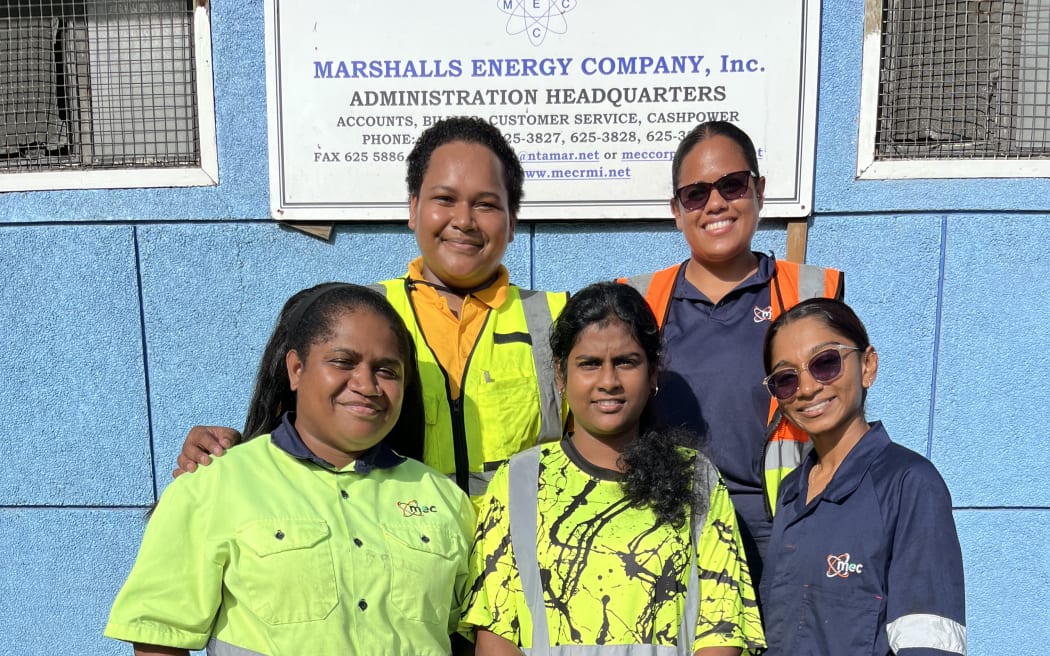By Eve Burns, of the Marshall Islands Journal
Thirty years ago, the presence of a female worker in the power plants in the Marshall Islands wasn’t just unusual: It rarely occurred.
Fast-forward to 2025, and five women engineers from Fiji are working for the Marshalls Energy Company in Majuro in multiple departments, including working at the power plant, in the System Planning and Engineering Services Division, and in data analysis.
All five say their experience working in the Majuro with the government’s utility company has been “transformative” for them. But they are also having an impact on the Marshalls Energy Company (MEC) in a variety of ways, including by breaking into a traditionally male-dominated work sector.
When you see any of the women on the job or as they are clocking out, they dress just as the men do: With safety clothing and heavy boots.
Although the current crop of female engineers is from Fiji, their presence is a daily reminder to Marshallese young women that the sky is the limit when it comes to education, training and future job opportunities.
Eve Burns connected with the five young women engineers to learn more about them.
Cheryl Shirley is an electrical engineer at the MEC power plant. Cheryl said she came to the Marshall Islands on a two-year contract, unsure of exactly what to expect but eager to contribute and grow. As her time here progresses, she found a deep connection not only with the community but also with the values and challenges that shape life on the islands.
“This experience has been transformative – both professionally and personally,” she said. “Looking ahead, my plans extend beyond the original (contract) timeframe. I hope to stay longer, to continue learning, and to give back in more meaningful ways.”
Shannon Prakash has a bachelor of electrical and electronics engineering from the University of the South Pacific.
She is working at the MEC Compliance and Revenue Protection Unit as a data analyst. Utility company management said the work of this unit over the past year has resulted in an “extraordinary 60 percent reduction in system losses” by making use of advanced accounting capabilities to identify losses, theft and billing issues.
She said her aim is to constantly review herself and her performance here and see what opportunities are available after she’s completed the projects she’s working on for MEC, as well as taking into consideration the future plans and projects of MEC.
Lucy Victoria Vuetaki Tifere is an electrical engineer with the System Planning and Engineering Services Division at MEC. In this capacity, she contributes to the technical planning, development, and improvement of energy infrastructure to support reliable and sustainable power delivery across the Marshall Islands.
“Prior to joining MEC, I was employed at Goodman Fielder International, a leading food manufacturing company (in Fiji),” she said. “This role allowed me to gain valuable industry experience and apply engineering principles within a high-demand operational environment – strengthening both my technical and problem-solving skill.”
She received a bachelor of electronics engineering in instrumentation and control, with honors, from Fiji National University. Lucy’s academic and professional experiences have “equipped me with a strong foundation in electrical systems, instrumentation, and energy system design,” she said.
Vasiti Qolikoro Kotoiwasawasa is currently serving as an electrical engineer with MEC’s System Planning and Engineering Services Division.
Before joining MEC, she spent seven years working for FMF a Food Manufacturing Company in Fiji a space where attention to detail, strategic thinking, and teamwork are essential.
“Today, my focus is on maintenance co-ordination with Computerized Maintenance Interface Systems,” she said.
“While it may not always be front-page work, it’s a role that ensures the reliability of systems that people rely on every single day – power, infrastructure, and public service continuity. It gives me purpose knowing that my contributions, though often behind the scenes, make a real difference.”
Vasiti said being a woman in a male-dominated field has been one of her greatest challenges. “I’ve had to learn to stand my ground, speak up, and prove my capabilities – not just once, but continuously,” she said.
“It has tested my resilience and sharpened my confidence. I believe that representation matters, and by being present and committed, I hope to inspire other women and girls who dream of working in technical fields.”
She said she was proud “to be part of the team that keeps the lights on, quite literally, for this island nation,”
Alexandra Lutuni is currently on a two-year contract with the MEC as an electrical and electronics engineer.
“My journey into engineering was deeply inspired by my older siblings,” she said, pointing to her “sister, one of the few female sea captains in the Pacific. Watching her pursue a challenging and rewarding career in a traditionally male-dominated field instilled in me a strong sense of purpose and resilience.
“Her example gave me the courage to follow my own path into engineering.”
She said that over the course of her career, she’s come to appreciate engineering not just as a technical discipline, but as a transformative experience. It has taught her how to think critically, adapt quickly, and work collaboratively with people from all walks of life. “It’s shaped the way I approach problems and helped me grow both professionally and personally,” she shared.
“Being part of the energy sector in the Marshall Islands has been incredibly fulfilling. I’m proud to contribute to a team that’s focused on sustainable development and innovative energy solutions,” she said.
An indication of the positive experience these five engineers are having is that all of them indicated their interest to continue working in Majuro with the Marshalls Energy Company beyond their initial contract periods.

